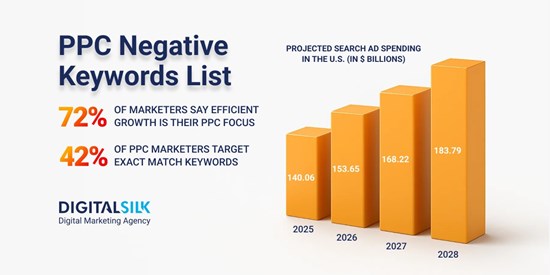Miami, Florida--(Newsfile Corp. - June 25, 2025) - Digital Silk, an award-winning agency focused on creating brand strategies, custom websites, and digital marketing campaigns, has published a new guide aimed at helping U.S. businesses improve the efficiency of their PPC advertising through the use of negative keywords.

Digital Silk Breaks Down the Role of PPC Negative Keywords in Supporting U.S. Ad Budget Efficiency
To view an enhanced version of this graphic, please visit:
https://images.newsfilecorp.com/files/10732/256668_39bba13da495c97e_001full.jpg
With U.S. digital ad spend projected to surpass $298 billion in 2025, according to Statista, marketers face growing pressure to ensure budgets are spent on high-intent traffic. Negative keywords-terms that prevent ads from showing in irrelevant searches-can help eliminate non-converting clicks.
By refining the keyword targeting strategy, brands can potentially reduce wasted ad spend, increase click-through rates (CTR), and improve return on ad spend (ROAS) across search campaigns.
Insight from Digital Silk's CMO
"PPC campaigns without a strong negative keyword list can quickly become inefficient," said Jordan Park, CMO at Digital Silk. "We created this guide to help marketing teams identify blind spots in their targeting and increase the precision of their ad delivery."
Types of Negative Keywords & Their Applications
The article details the difference between broad match, phrase match, and exact match negative keywords, along with practical examples for each. It also outlines how to apply these filters across platforms like Google Ads to reduce visibility on non-relevant queries.
Best Practices for Implementation
Digital Silk outlines best practices for marketers to follow when building a negative keyword list:
- Use search term reports to uncover irrelevant or underperforming queries
- Segment negative keywords by campaign or ad group to avoid overblocking
- Continually review and optimise the list to adapt to evolving search behaviour
This approach may support performance marketing teams in refining ad delivery and protecting budget allocations, especially in competitive sectors such as retail, SaaS, and B2B services.
Relevance in 2025's Automated Ad Ecosystem
As AI and machine learning continue to automate aspects of ad targeting, the manual oversight of keyword lists-including exclusions-remains essential. Improper keyword targeting can lead to ad fatigue, irrelevant impressions, and higher bounce rates.
"In the current landscape, relevance drives results," added Jordan Park. "Negative keywords are a simple yet powerful lever for advertisers to pull-especially when aiming to increase performance without scaling budgets."
The full article, "PPC Negative Keywords: What They Are & How to Use Them", is available now on the Digital Silk website.
About Digital Silk
Digital Silk is an award-winning Miami digital marketing agency focused on growing brands online. With a team of seasoned experts, Digital Silk delivers industry-leading digital experiences through strategic branding and cutting-edge web design to support engagement and digital marketing services that help improve visibility.
Media Contact
Jessica Erasmus
Marketing Director & PR Manager
Tel: (800) 206-9413
Email: jessica@digitalsilk.com
To view the source version of this press release, please visit https://www.newsfilecorp.com/release/256668

